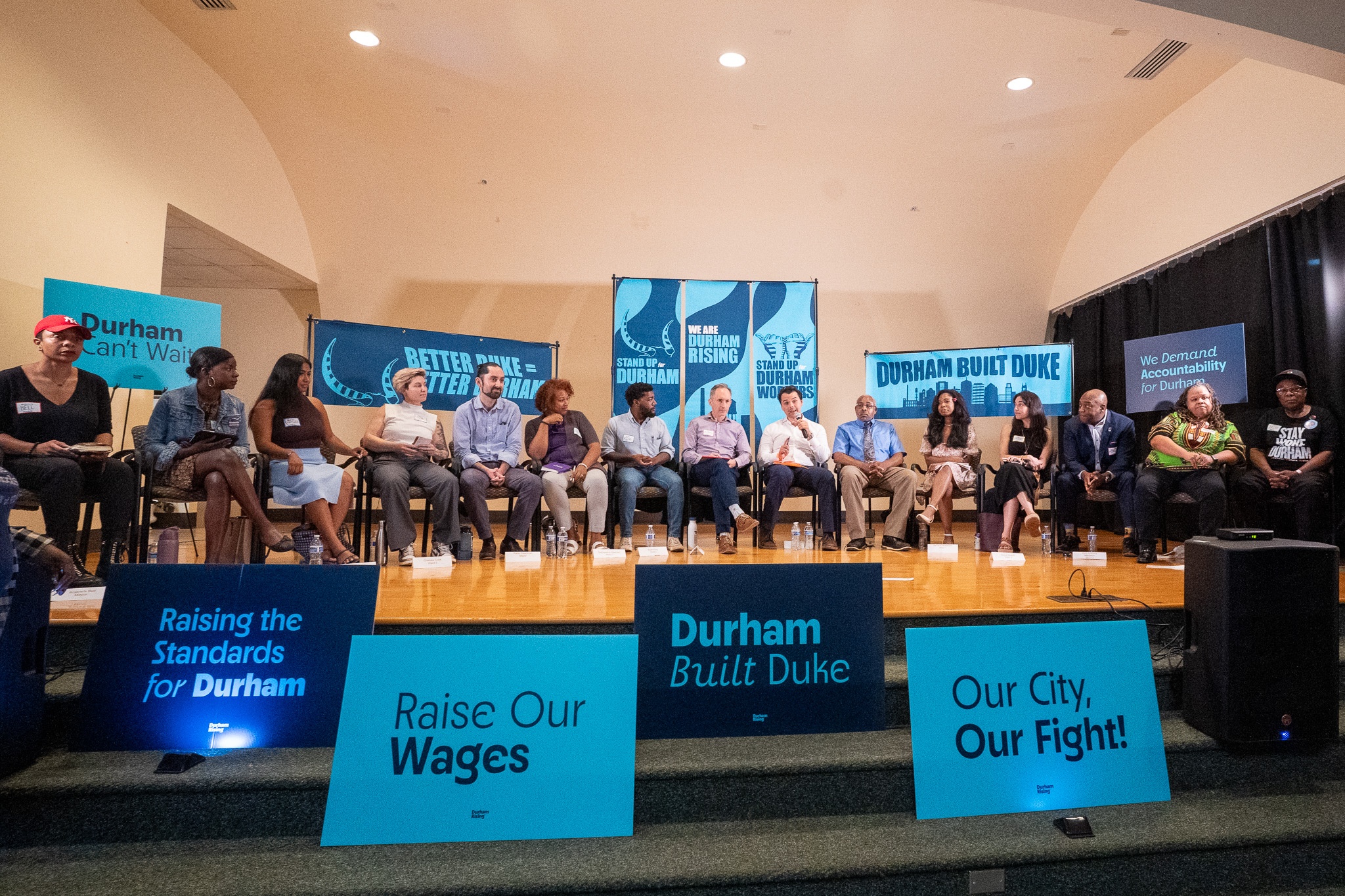Durham Rising confronts Duke’s troubled labor history

In August, the Durham Rising coalition held a candidate forum for mayoral and city council hopefuls; 14 of the 15 attending candidates signed a petition supporting the group's demands calling on Duke University to increase wages and make bigger investments into the Durham community. (Photo: Durham Rising)
Since its founding by a Gilded Age tobacco tycoon, Duke University has been a hotbed of labor unrest — and the university has earned a reputation for its often fierce resistance to worker demands.
Now, as Duke prepares to observe its Founders’ Day weekend, the elite Southern university faces a new challenge from Durham Rising, a coalition of labor and community groups calling on the school to raise worker wages to $25 an hour and make bigger investments in its surrounding community.
Durham Rising, which is mobilizing a march near Duke’s campus this week, points to the university’s dependence on its workers in their call to action: “We know that Duke’s founders didn’t build Duke alone. This year, we will celebrate the legacy of the working people who built Duke and all of us who have kept Duke running day after day, year after year.”
These competing ideas of which “founders” to honor in Duke’s past is a key backdrop to the latest chapter in the university’s labor history — a history, scholars say, that has been marked by disregard for, and, at times, outright hostility towards, workers’ concerns.
The rise of the Dukes and Duke
Today, Duke University and its health system are the largest employer in Durham County, North Carolina, and the second-largest private employer in the state, with more than 48,000 workers.
James Buchanan “Buck” Duke, a major turn of the century industrialist and tobacco magnate, transformed the small Methodist school that was Trinity College into Duke University in 1924 by making it the primary beneficiary of the Duke Endowment, a private foundation created to funnel a portion of the Duke family’s massive wealth to their favored causes.
Key to the Dukes’ business success was the decision to embrace cigarettes — a cheap product that was just starting to gain popularity — and automated cigarette-rolling machines.
Duke’s adoption of these new machines sparked his first confrontation with organized labor. In the early 1880s James B. Duke had brought more than a hundred Eastern European Jewish immigrants to Durham to hand-roll cigarettes for the W. Duke & Sons company. However, these skilled workers, who had primarily learned their trade rolling cigarettes for Russian aristocrats, soon found their jobs threatened by Duke’s aggressive promotion of the Bonsack cigarette-rolling machine.
The workers quickly unionized. However, in response, J.B. Duke reduced the quota of cigarettes workers were allowed to roll each week, effectively cutting their pay in half, while allowing non-union workers to exceed the quota. The skilled, unionized immigrant workers were forced out, replaced by non-union local white workers. Black workers, meanwhile, were confined to “unskilled” jobs hauling, sorting, cleaning, and stemming tobacco; Black workers were paid far less than white workers, and Black women least of all.
The immense profits from Duke's low-wage, anti-union tobacco empire were instrumental in the rise of Duke University itself — a fact not lost on Duke's workforce. As related in Dolores Janiewski's history, Sisterhood Denied, a machine operator at one Duke factory said: “Oh, they can make plenty of money — enough while old man Duke was slave-driver so he could give fifty-two million dollars in one whack to a little old college here called Trinity College, to get them to call it Duke University. That's money our people before us sweated to make for him.”
Meanwhile, fellow industrialists saw in Duke University a place that could train a professional class that would be friendly to business and keep labor in check. When J.B. Duke launched the Duke Endowment to support the university in 1924, B.D. MacNeill, an associate of Duke’s, described his reasons for funding the university, as told in Karen Brodkin’s Caring by the Hour: “Public thinking and public attitudes toward private business . . . are determined primarily by lawyers who dominate government; by preachers who dominate religion; by doctors who dominate life and death. Duke University would have the outstanding medical school of the South, and hard by would be a great school of theology and another of law. It was simple enough. Here were the sources of public opinion. The University would take care of them.”
Labor unrest in the 1960s
Another key moment in Duke worker organizing — and the university’s bitter opposition to labor activism — came in the 1960s. At the time, due to its non-profit status, Duke was allowed to pay employees below the federal minimum wage of $1.25 per hour. However, it was primarily Black employees who earned these sub-minimum wages.
In response, well-known Black labor organizer Oliver Harvey helped to found the Duke Employees Benevolent Society in 1965. The Society demanded that Duke raise the majority-Black housekeeping staff’s wages from $0.85 per hour to the federal minimum, and institute basic benefits, including overtime pay, unemployment insurance, improved pensions, sick pay, and disability insurance.
As described in Brodkin's history, Duke’s response was to fire several workers, which only increased Black workers’ enthusiasm for unionization, and led to the successful affiliation of the Duke Employees Benevolent Society with the American Federation of State, County, and Municipal Employees (AFSCME) and its evolution into Local 77. In a letter responding to a faculty supporter of the union, then Duke University president, Douglas Knight, implied that Duke was doing Black workers a favor by allowing them to earn a sub-minimum wage, since they lacked the competency required to deserve the federal minimum of $1.25 per hour.
After Dr. Martin Luther King, Jr.’s assassination in April 1968, Duke students held a sit-in calling for an end to racist practices at the university, including sub-minimum wages for Duke’s majority-Black service and cafeteria workers. When president Knight refused their demands, the sit-in grew to almost 2,000 students and threw its support behind Local 77’s efforts.
On April 8th, 1968, Local 77 launched a strike of campus and hospital food service workers that lasted 13 days before Duke offered to raise its minimum wage to the federal minimum of $1.60. However, Duke continued to refuse to recognize the union until 1972.
Local 77 has continued to represent service workers at Duke. This summer, the union announced that it had secured a new contract guaranteeing new benefits and an expanded wage scale.
The latest wave of Duke worker activism
Duke Graduate Students Union (DGSU), which was first recognized in 2023, is the latest union to secure a contract with the University, after nine years of organizing.
Duke graduate students began organizing towards a union in 2016, only a few months before the National Labor Relations Board (NLRB) ruled that graduate students have the right to collectively bargain. With the help of the Service Employees International Union (SEIU), Duke Graduate Students Union held its first union election in 2017. However, hundreds of the ballots cast in that election were challenged by the university, causing DGSU to withdraw its petition for certification.
DGSU continued to organize, and while Duke ultimately agreed to raise its graduate stipend in 2019, the university refused to recognize the union and denied that the union’s efforts had anything to do with the change. The stipend increase was also delayed until 2022, which made it likely that most of the graduate students who had organized in favor of the increase would not benefit.
The graduate student union renewed its campaign for recognition in 2022. When DGSU reached the threshold of 50% support for the union in early 2023, they requested that Duke voluntarily recognize the union, as peer institutions like NYU and Georgetown University had done. Instead, Duke not only refused to recognize the union, but sought to challenge the previous NLRB decision that allowed for graduate student unionization, arguing that graduate students were not employees at all.
The NLRB rejected Duke’s challenge and allowed DGSU’s election to move forward, which the union won with 1,000 ballots in favor of unionization and only 131 against. Duke was forced to recognize the union and begin contract negotiations. In July 2025, after two years and 32 bargaining sessions, DGSU announced that they had reached a contract agreement with the university that includes increased stipends for graduate students, 12 weeks of parental leave, childcare subsidies, and other benefits.
This week, Durham Rising will once again be calling attention to Duke’s conflicted labor history, and calling on the university to honor not just the school’s deep-pocketed donors and trustees, but the tens of thousands of workers who make it run.
“On Founders’ Day 2025, we are calling on Duke University to show bold leadership by protecting higher education and raising standards across the region through good, union jobs and giving back to the community that makes Duke run by investing in our public schools, affordable housing, and city infrastructure,” the coalition declared in its call to action this week. “Duke has a responsibility in this moment to protect and invest in the workers and families who keep the university and our community running — not the billionaires who care more about their stock portfolios than our families.”
DISCLOSURE: The Institute for Southern Studies, publisher of Facing South, has partnered to provide research and analysis for the Union of Southern Service Workers, a member of the Durham Rising coalition.
Tags
Lekha Shupeck
Lekha Shupeck is Director of Programs at the Institute for Southern Studies, publisher of Facing South, where she helps oversee programs and strategy. Before joining the Institute, Shupeck held leadership positions at Documented, All On the Line, and the ACLU of North Carolina.
